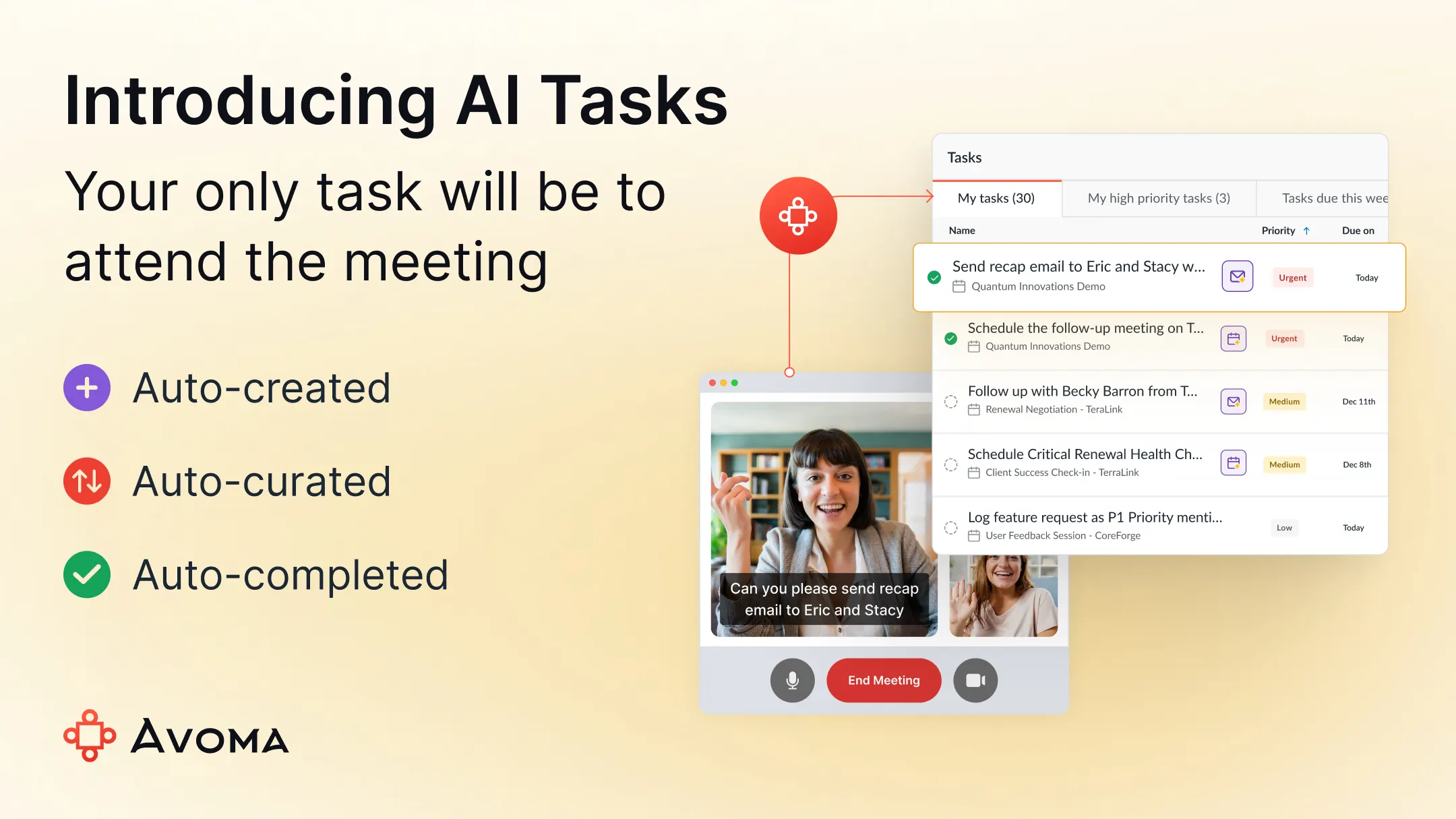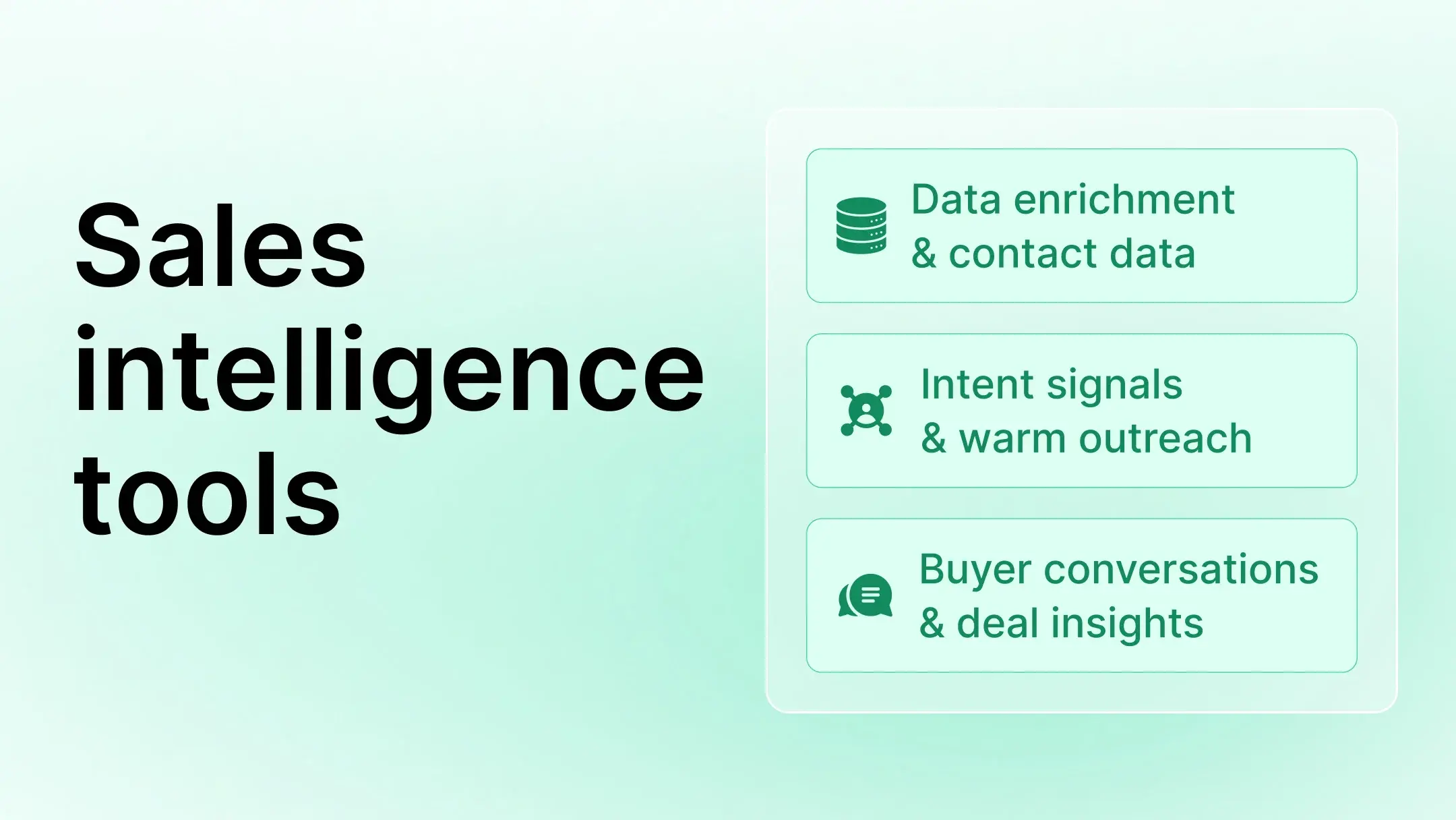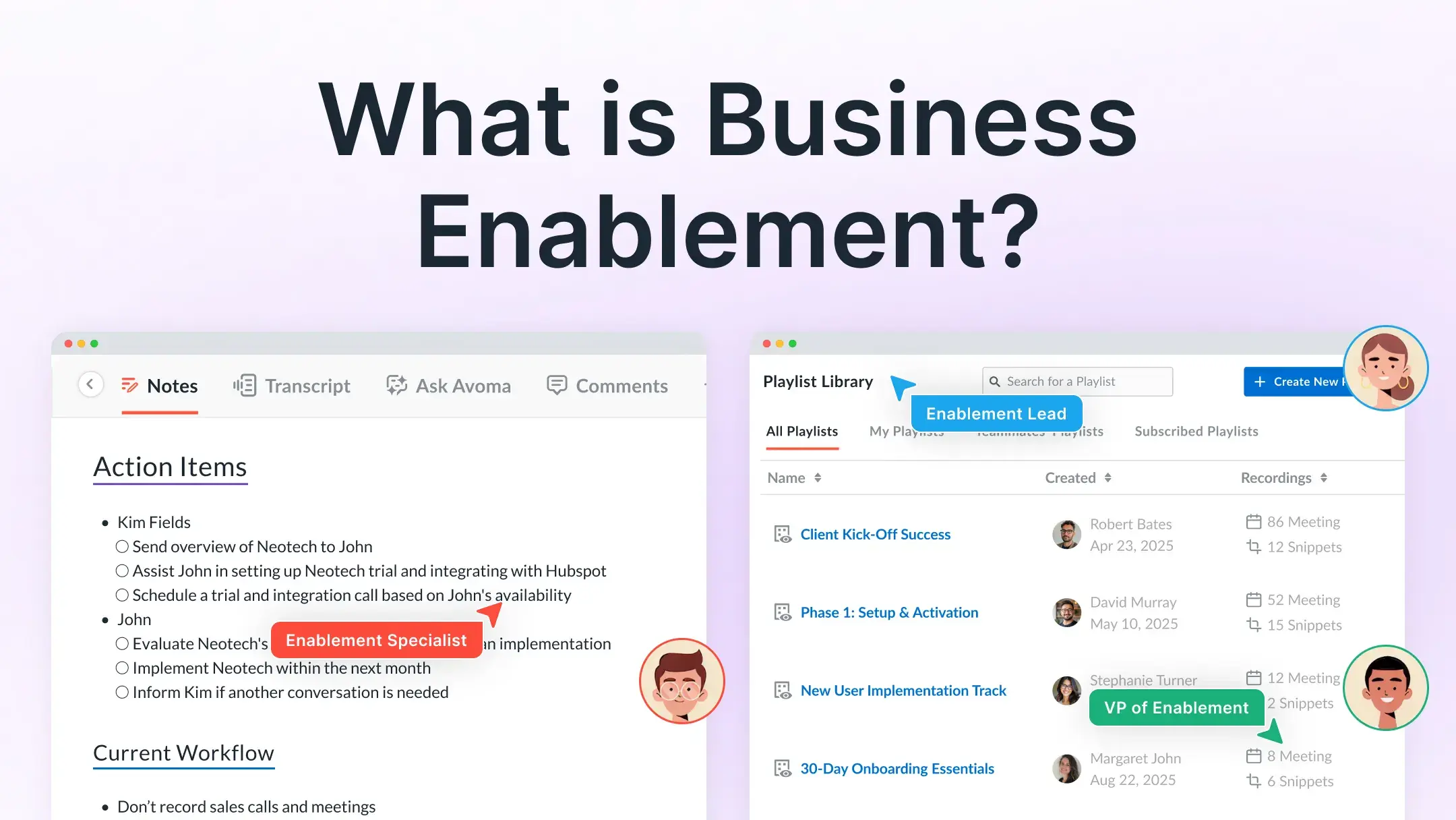How Customer Success teams use Conversation Intelligence software
Table of Contents:
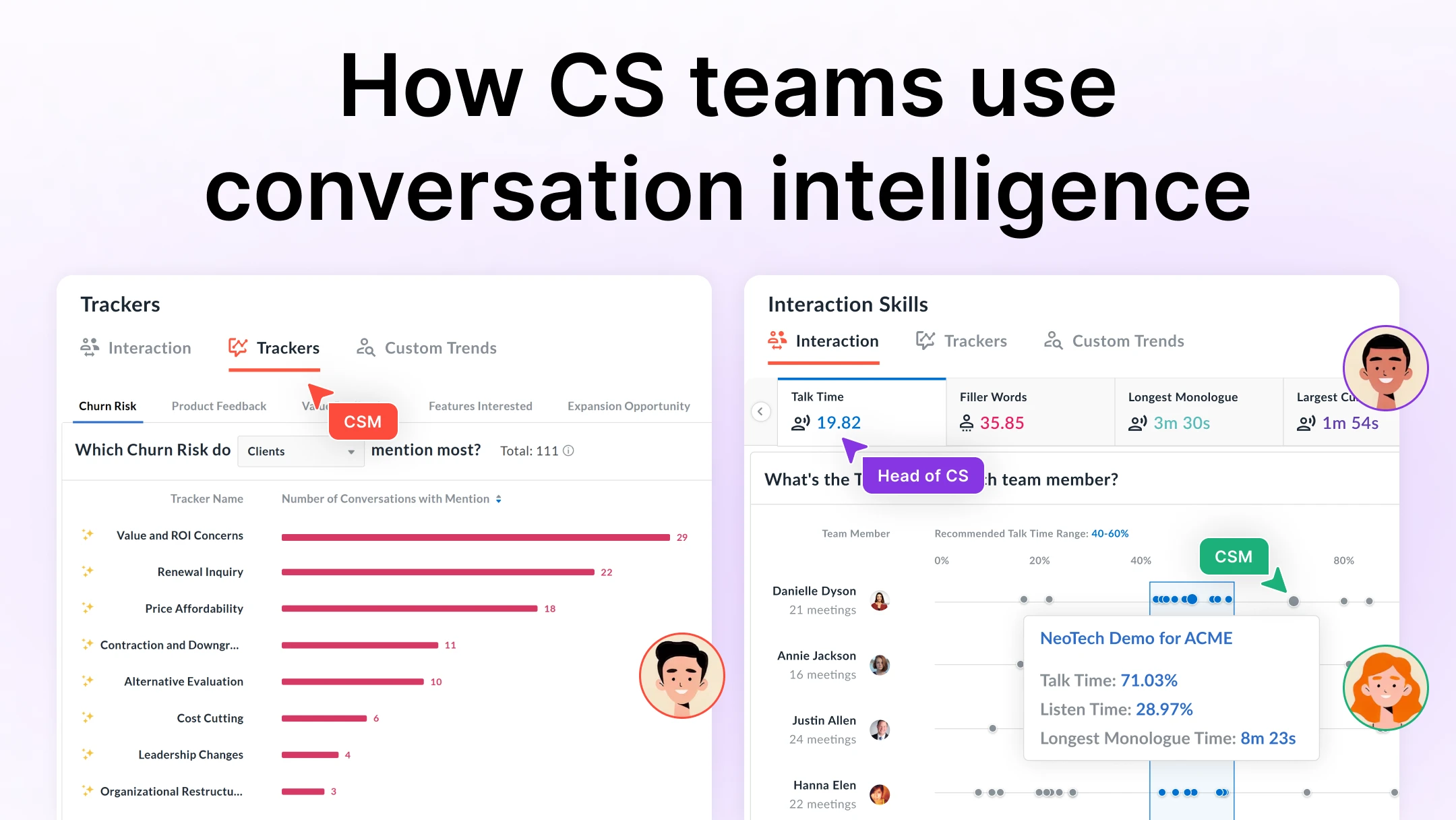
Conversation intelligence for Customer Success teams has become essential for driving retention, adoption, and expansion. Customer calls contains insights about product fit, customer expectations, and market trends. However, most of it gets lost in unstructured notes or never logged in the CRM.
Customer Success leaders use conversation intelligence to automatically capture interactions, analyze it for churn signals, and surface actionable feedback across teams.
In this blog, you’ll learn how high-performing customer success teams use conversation intelligence to uncover risk early, strengthen relationships, and drive retention and expansion.
Key takeaways
- Conversation intelligence software gives Customer Success teams complete visibility into customer health and engagement.
- Customer Success can capture and analyze conversations and reveal early signals of churn and expansion.
- Automated recording, transcription, and AI notes remove manual work so CSMs can focus on solving customer problems.
- Conversation insights make coaching faster, ramping smoother, and customer interactions more consistent across the team.
- CS leaders gain confidence in renewal forecasts because every insight comes from real conversations, not assumptions.
Why Customer Success teams are turning to conversation intelligence
Customer Success teams are under constant pressure to reduce churn, improve adoption, and grow existing accounts. Yet most still rely on static CRM data or anecdotal notes that explain what happened but not why it happened.
AI-powered platforms like Avoma fills this gap by bringing conversation intelligence into existing CS systems. It analyzes customer conversations and engagement with CRM data, and gives CS teams visibility into customer health and risk factors that shape renewals and expansions.
In 2025, leading CS teams use conversation intelligence to:
- Automate note-taking, data capture, and reporting.
- Identify early signs of churn and highlight product usage or adoption trends.
- Improve coaching consistency and accelerate onboarding.
- Strengthen renewal forecasts using real engagement data.
The impact of conversation intelligence grows as the CS function matures. To see how, let’s look at how Customer Success teams evolve as organizations scale and how their needs change at each stage.
How Customer Success teams evolve as organizations scale
Early stage
Generalist CSMs handle onboarding, renewals, and product feedback. They lack consistent documentation, and valuable customer context often gets lost. Conversation intelligence automates capture, generates structured notes, and gives teams visibility into accounts.
Growth stage
Teams expand to include dedicated onboarding, adoption, and CS operations roles. As processes multiply, communication consistency becomes critical. Tools like Avoma standardize agendas, offer team-wide visibility, and make coaching scalable. Structured onboarding programs boost first-year retention by around 25%, and conversation intelligence helps teams reach that benchmark with accurate context and repeatable workflows.
Enterprise stage
Mature companies organize CS teams by motion—onboarding, adoption, renewal, and expansion. Conversation intelligence unifies these functions by connecting feedback, engagement, and deal health data in one place.
What CS teams expect from conversation intelligence
1. Customer visibility: CS teams need a complete view of customer interaction to understand engagement, sentiment, and adoption trends over time. Conversation intelligence automatically captures all meetings, summarizes key moments, and highlights blockers.
2. Churn and expansion signals: Proactive early warning signs of risk or growth are critical for CS teams. With AI-powered conversation intelligence, they get alerts and signals when customers express frustration, mention feature gaps, or discuss new needs. This helps them act on churn or expansion opportunities before renewal cycles.
3. Collaboration and knowledge sharing: CS teams can share customer insights with cross-functional teams like Product, Marketing, Support, and Sales. This aligns teams about customer needs and next steps.
4. Consistent coaching and onboarding: Leaders use conversation insights and talk-pattern data to coach CSMs, validate playbooks, and onboard new hires faster through curated examples of real customer conversations.
How Customer Success teams use conversation intelligence software
Head of Customer Success: Driving retention and renewals
As Head of CS, you drive renewals and measurable expansion. This requires visibility into customer meetings and the ability to detect risk early.
Many CS leaders use tools like Avoma as a health and engagement intelligence layer that connects with the CRM. It combines conversation insights, sentiment trends, and account signals so leaders can coach effectively and prioritize renewals at risk.
How to operationalize retention with conversation intelligence
- Unify customer visibility: Review active accounts based on key metrics like churn risk, value realization, and expansion opportunity.
- Spot early signals: Identify declining engagement or recurring blockers in customer conversations before renewal deadlines.
- Coach with context: Analyze topic and talk-pattern trends to help CSMs address churn triggers faster.
- Validate growth plays: Use data-backed trends from conversation intelligence to justify expansion opportunities.
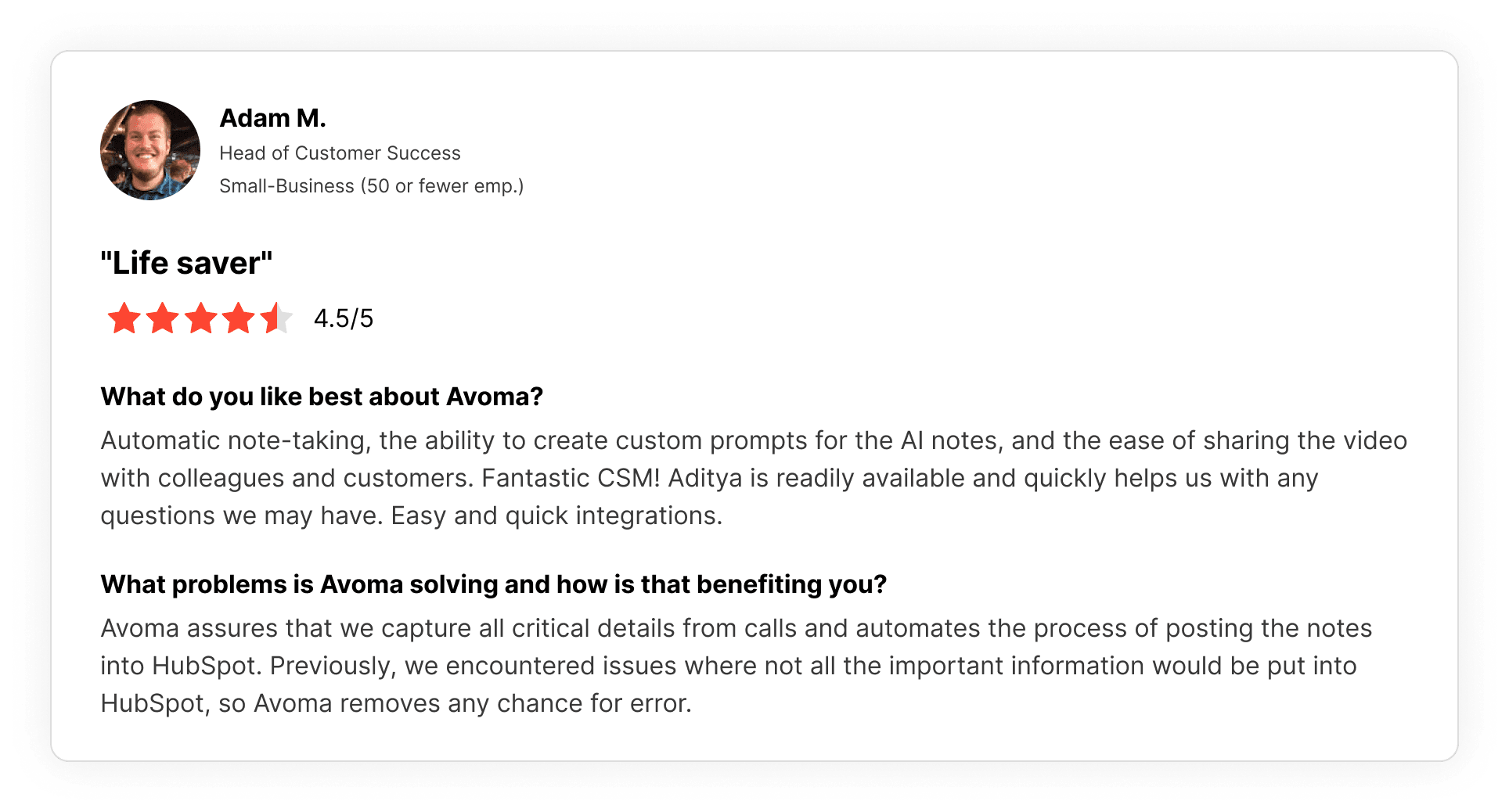
Customer Success Managers: Building stronger relationships
Customer Sucess Managers spend most of their time on customer calls, capturing insights, resolving issues, and driving adoption. Manual note-taking and inconsistent CRM updates waste hours every week.
Conversation intelligence software generates instant AI notes and enables the teams to focus on active listening while capturing structured data for next steps, pain points, and goals.
How to work smarter with conversation intelligence
- Accelerate follow-ups: Search conversations by topic or speaker to prepare QBRs or resolve issues faster.
- Share insights: Clip key snippets from meetings to highlight customer feedback and share instantly via multiple apps
- Improve customer satisfaction: Prepare for calls with call agenda templates for seamless meetings.
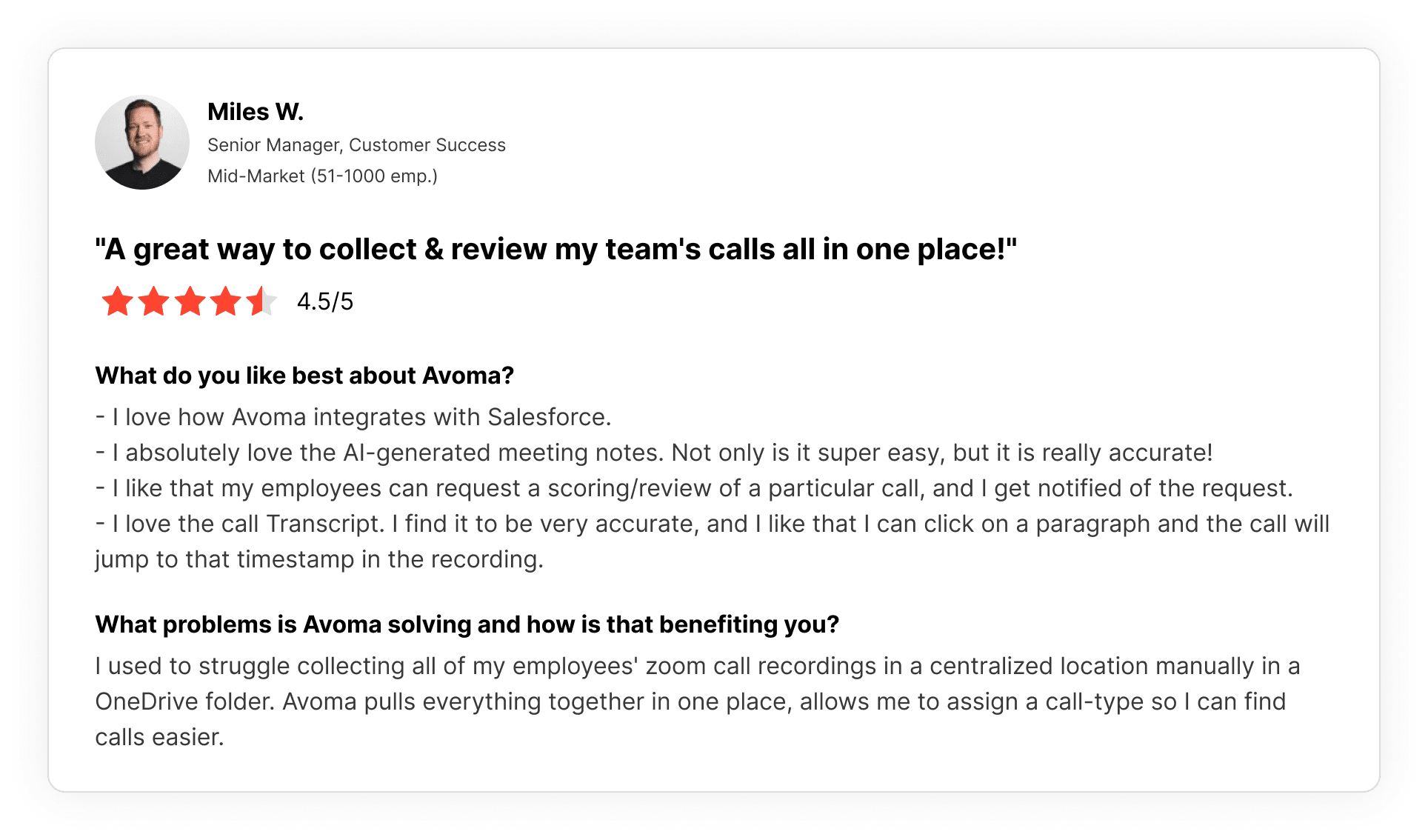
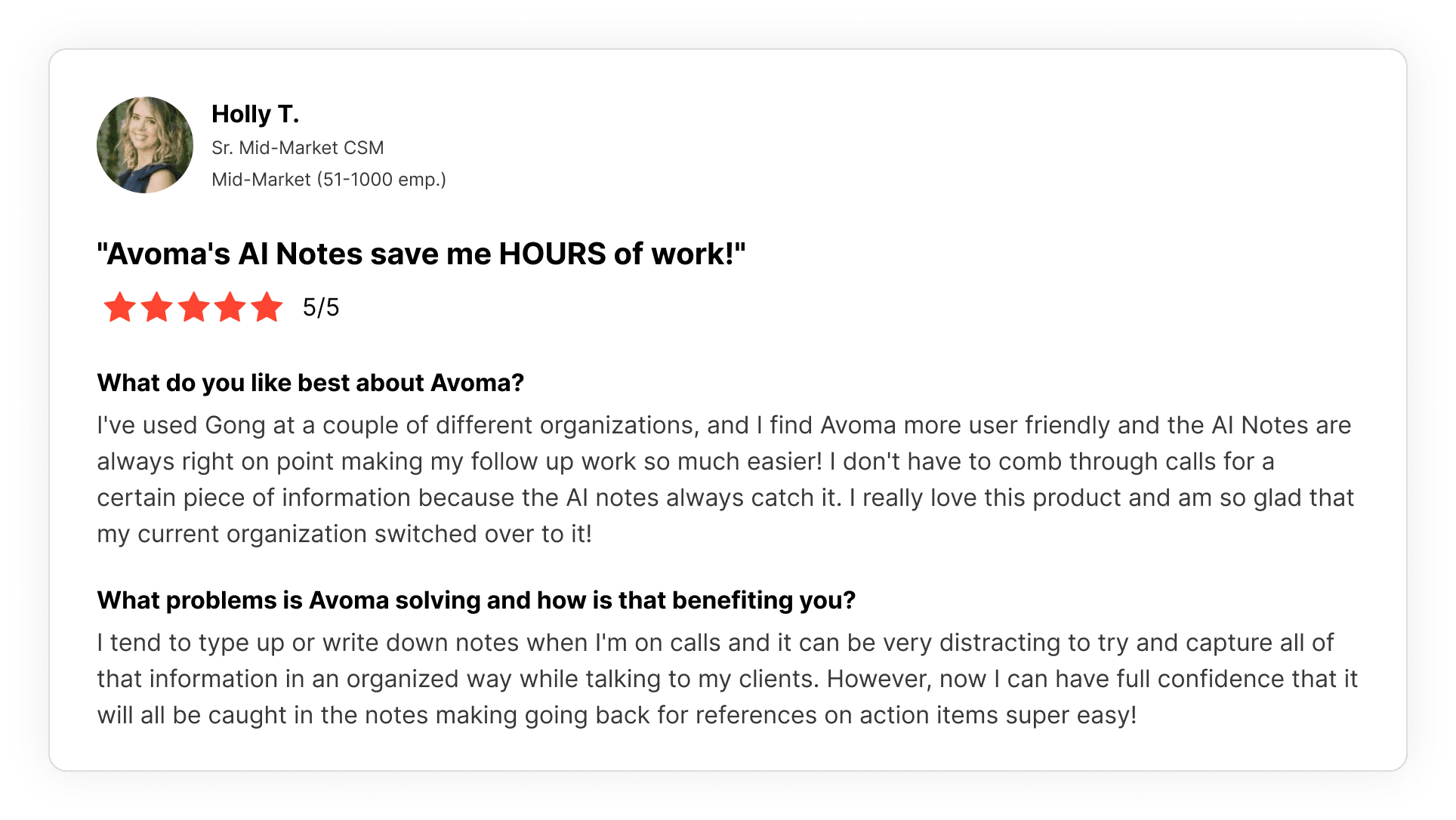
Onboarding and Implementation Managers: Reducing time-to-value
Onboarding sets the tone for customer retention. Teams need to manage expectations, remove blockers, and ensure early adoption.
Conversation intelligence helps document every kickoff, training, and review call. Onboarding teams tag key themes like pain points, product feedback, etc., to detect friction and escalate issues faster.
How to deliver smoother onboarding
- Standardize onboarding calls: Use agenda templates for kickoffs and check-ins.
- Track issues automatically: Apply keyword trackers to capture blockers, product gaps, and sentiment.
- Share context: Use snippets to brief engineering or product teams.
- Measure adoption progress: Review engagement across accounts to validate value realization.
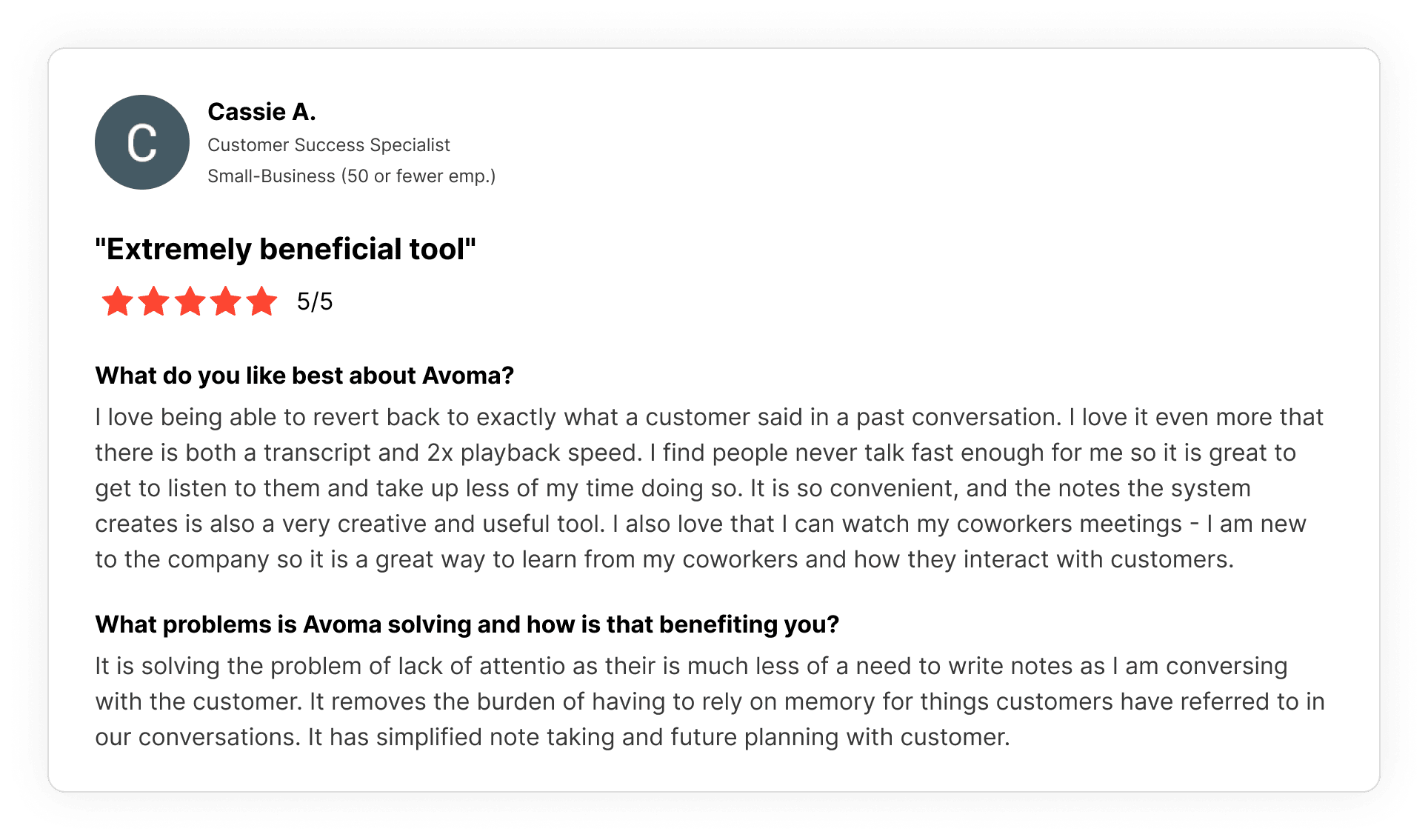
Renewals and Expansion Managers
Renewal and expansion roles depend on accurate insight into customer sentiment and product value. Traditional health scores miss context, making it hard to predict which accounts are ready to grow.
Conversation intelligence identifies value moments, expansion cues, and buying signals in customer interactions. It helps renewal teams validate which customers are seeing measurable success and which need attention.
How to identify and act on growth opportunities
- Track expansion signals: Use trackers like Features Interested and Expansion Opportunity.
- Show value in QBRs: Pull real quotes and snippets that demonstrate outcomes achieved.
- Preempt risk: Identify declining engagement early and act before renewal dates.
- Support negotiations: Ground renewal discussions in real customer feedback and usage proof.
Enablement and Coaching leaders: Improving team performance
Coaching and ramp-up take time, especially when shadowing live calls. Enablement leaders use conversation intelligence software to scale training by building curated playlists of effective conversations.
Topic and talk-pattern analysis helps identify what top performers do differently and how to replicate their behavior across the team.
How to scale coaching with conversation intelligence
- Build curated playlists: Group top moments by objection handling, upselling, or renewal discussion.
- Coach with precision: Review talk-time balance and question patterns.
- Accelerate ramp-up: Assign playlists to new hires for faster onboarding.
- Track improvement: Compare talk-pattern trends before and after coaching sessions.
Customer Insights and Product Liaison: Amplifying the voice of the customer
Product and Support teams rely on CS to surface accurate feedback. Voice of Customer data often gets lost in meeting notes or Slack threads.Conversation intelligence gives them direct access to searchable transcripts, snippets, and topic trends. They can track how often specific features or issues appear in conversations and act proactively.
How to share customer feedback
- Capture customer sentiment: Use trackers like Product Feedback and Identify Pain.
- Search across conversations: Find trends in feature requests or recurring issues.
- Share snippets instantly: Provide engineers and PMs with firsthand customer context.
- Close the loop: Update CS teams when fixes or new features go live.
Putting conversation intelligence to work for Customer Success
Conversation intelligence drives the most value when teams embed it in daily workflows. It connects directly to your CRM, capturing conversations, surfacing engagement insights, and aligning onboarding, adoption, and renewal activities around one source of truth.
As adoption grows, refine playbooks, coach with data from real conversations, and share best practices across the team. Each CS organization works differently, but teams that operationalize conversation intelligence build stronger relationships and improve retention.
When your teams and data stay aligned around authentic customer engagement, growth becomes predictable. Want to strengthen your Customer Success teams? Get in touch with our experts and see Avoma’s AI platform in action.
Frequently Asked Questions
Call recording only saves the audio or video file, which is rarely revisited. Conversation intelligence automatically transcribes and analyzes calls, highlights key topics like pain points or feature requests, links insights to CRM records, and generates AI summaries and action items—making it easy for teams to search, review, and act without replaying full calls.
Conversation intelligence adds value at every stage—but is especially useful as CS functions scale. Early-stage teams use it to automate notes and improve onboarding. Growing teams benefit from consistent coaching, shared visibility, and standardized processes. At the enterprise level, it becomes essential for aligning CS motions—onboarding, adoption, renewals—around one shared source of truth.
CS teams using conversation intelligence typically see faster onboarding, more accurate renewals, and improved retention. They gain visibility into account health trends, uncover expansion signals, and improve CRM completeness with AI-generated notes. Managers also report stronger team coaching, consistent messaging, and time savings across QBR prep, follow-ups, and reporting.
Conversation intelligence eliminates blind spots in customer engagement by capturing and analyzing every meeting. It replaces scattered notes and manual summaries with structured insights—so CS teams can detect churn risk early, track product feedback, and improve follow-up accuracy. It also bridges knowledge gaps across onboarding, support, and renewals by centralizing customer context.






What's stopping you from turning every conversation into actionable insights?



